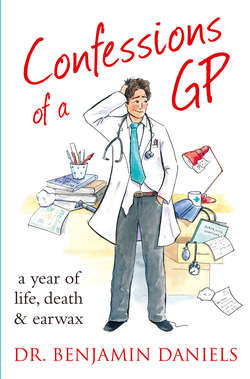Читать книгу Confessions of a GP - Benjamin Daniels - Страница 23
Connor
Оглавление‘It’s my kids, Doctor. They’re little fuckers. I can’t control ’em no more. Something’s gotta be done about it. My youngest, Connor, was brought home by the police the other day.’
‘How old is Connor?’
‘He’s three.’
I rack my brains trying to think what a three-year-old could possibly do to get himself in trouble with the police.
‘They caught him putting rubbish through the neighbours’ letter boxes.’
‘Was he out on his own?’ I ask incredulously.
‘Oh no, Doctor, Bradley and Kylie was with him, but they was the ones telling him to do it.’
I skim through the notes to see that older siblings Bradley and Kylie are six and seven, respectively.
Mum Kerry is actually very likeable. She is a stereotypical council estate mum. Only 25, but already has three kids with three different men who are all now nowhere to be seen. Life is hard for her and she has very little support. She genuinely wants the best for her kids and really wants help.
Unfortunately for her, the entirety of my knowledge on child behaviour comes from having watched a couple of episodes of Supernanny on TV. I’ve never been the sternest of people and given the way my cat walks all over me, I’m probably not the best person to ask about discipline.
‘I think he’s got that DDHD condition. You know, where they’re little shits but it’s ’cause there’s something wrong with the chemicals in their brain and that.’
I’ve met lots of parents whose children have had a diagnosis of attention deficit hyperactivity disorder (ADHD). The parents love the label because it now excuses the bad behaviour. The kids run riot round my consulting room, rifling through my sharps bin and using my ophthalmoscope as a hammer. Mum and Dad do nothing to stop them and then say, ‘Sorry about the kids, Doc. It’s the ADHD – nothing we can do … brain chemicals and that.’
I don’t disbelieve that ADHD exists but perhaps it has been overdiagnosed in recent years. The main symptoms are lack of concentration, being easily distracted and not being good at listening. I could probably persuade myself that Connor has these symptoms, but I’m not sure that they are related to brain chemicals. I guess some children are more prone to developing these symptoms than others, but in most cases isn’t parenting more likely to be the most significant factor rather than a brain disease?
I’m not going to send Kerry’s kids to the child psychiatrist. The wait is long and I don’t want these children labelled as psychiatrically unwell. I’ve heard there is a specialist social worker locally who gives individual and group parenting skills classes. Kerry is perfect for her.
Kerry comes back a couple of weeks later to let me know how it went.
‘I really like my parenting support worker. She told me I mustn’t call ’em little fuckers no more but instead they are good children with some c.h.a.l.l.e.n.g.i.n.g behaviour.’
She goes on to tell me about how she is now rewarding good behaviour, setting consistent boundaries and using the naughty corner. Hold on a minute, I could have told her that. This parenting adviser must have watched the same episode of Supernanny that I saw.
